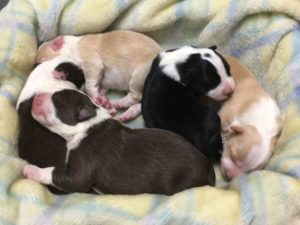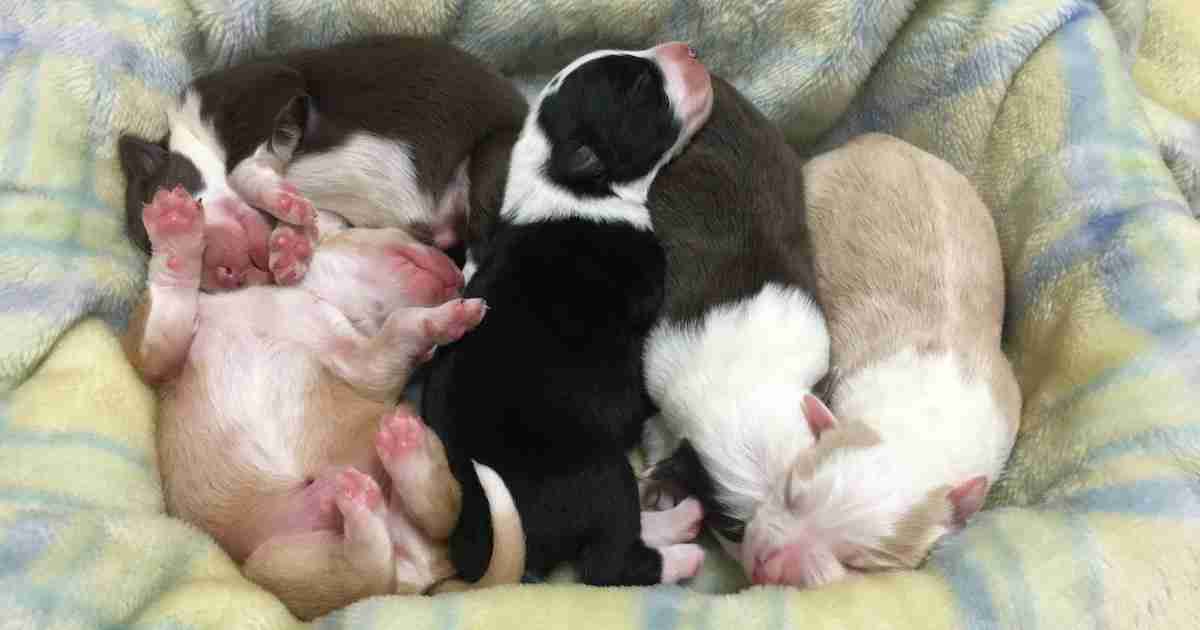Updated May 29, 2022
Hopefully you’ve read our guides to:
Now the fun really begins. Here’s what to do and what to expect during the first 6 weeks of a litter of puppies.
Post Whelping Check
Please come down to the clinic in the first 24 hours. We’ll make sure mum is healthy, look for retained placentas or puppies and check her milk production. We’ll also give each puppy a quick once-over to look for obvious and serious problems. All this can be done in a single appointment.
Runts
I’ve written about runts before. Suffice to say, it’s not a precise term and most pups called runts are actually just naturally smaller. You do need to make sure that smaller or less vigorous pups are getting equal access to teats.
Looking After New Puppies

The best way to keep an eye on the pups is a daily weigh-in. That way you’ll quickly notice if one of them is failing to gain weight at the same rate as the others. In big litters (usually larger breeds) there may not be enough milk production or teats for all the pups. The last thing you want is a fight for survival happening in your nest box.
In these situations, or whenever mismothering occurs, supplementing the pups with puppy milk formula is easy to do. Just ask for help.
You may also find that one pup is getting too big. This is especially common with small litters and can have serious consequences for their leg development if not corrected. Only a vet can tell you if this is happening but weighing the pups should get you suspicious.
Remember what I said: quiet pups are usually happy pups.
Mother’s Health
Most suckling bitches will lose weight until the puppies are weaned. This is usually OK but needs watching. Occasionally two serious problems occur:
- Mastitis: when a mammary gland becomes infected. The affected gland is hot and painful, and the mother is quite unwell.
- Hypocalcaemia: sometimes called puerperal tetany, when calcium losses in milk exceed the mother’s ability to maintain normal blood levels, causing severe muscle tremors.
For both of these, immediate veterinary attention is required and the pups are best weaned onto formula.
Neonatal Puppy Development
Puppies with open their eyes after 2 weeks and by four weeks are able to walk, run and play. Starting puppies on solids isn’t too hard, and comes naturally with age. From two weeks of age, offer a moistened puppy food near where the pups are exploring. Their curiosity will usually do the rest.
From four weeks they should all be eating solids and by six weeks it’s possible to wean them off the mother. In practice, pups will continue to suckle as long as mum lets them.
When Do Puppies Need Their First Vaccination?
At six weeks of age all puppies should visit the vet for a health check and C3 vaccine. If mum needs a booster this is a good time as well. It is essential that all puppies don’t just get immunised but also receive an individual complete health check prior to sale or rehoming. This is to check for common congenital conditions and especially heart murmurs. Better you know now that sell a puppy with a serious defect.
Please note that microchipping is now also compulsory before sale in most Australian states. Make sure you get a certificate for each puppy that will be included in the sale documents.
It’s also possible to have the puppies desexed before sale, especially if you are concerned the new owners may breed inappropriately. Our advice? Read here why I believe early desexing isn’t always in a puppy’s best interests.
Worming
The biggest infectious disease threat to puppies is worm infestation. During pregnancy, the mother’s immunity is lower and worms take the opportunity to migrate into the foetuses via the placenta.
Puppies and mothers should be wormed every two weeks from two weeks of age. That’s the same length of time as the worm life cycle, so they can’t build up. As your vet for a wormer safe for young puppies.
Quarantine Rules
Pups are susceptible to all sort of common bugs and you need to protect them. Maintain strict quarantine with all visitors and especially people coming to view the pups. It’s likely they were just handing other dogs and puppies elsewhere.
Handwashing with soap and water is compulsory, not those silly alcohol gels. Parvovirus is spread in soil and dirt, so getting everyone to turn Japanese and leave their shoes at the front step is another good idea. The same applies to you of course, and it’s a good idea to avoid other dogs for the moment.
Toileting
Puppies toilet train quicker if they haven’t already developed bad habits. You aren’t responsible for toilet training the puppies but you can make it easier for the new owner by not letting them pee and poo on the floor. All you need to do is cover the area around their nest in something else, especially training mats or newspaper. Medical suppliers can get you incontinence mats much more cheaply than pet stores.
Don’t do what I saw one breeder do and use old sheets; the puppies learnt to see any fabric on the floor as a toilet!
Choosing New Owners
If you’ve bought a puppy from a registered breeder you’ll know how many questions they put you through. That’s a good standard to keep. Some people may get offended, but most will understand you’re just trying to do the right thing.
A good idea is to send each puppy with a sample of the food they are eating (to avoid sudden change) and a piece of their nursing blanket (to provide familiar smells). Some breeders even fit an Adaptil collar as an excellent way to further reduce anxiety and help puppies settle faster.
One last piece of advice is to get the new owners to contact their vet straight away. If their vet is anything like us, they will offer them a free puppy checkup to get them on the right track straight away, and be able to offer early finish vaccines to get the puppies out and about by 11 weeks of age.
You’ll shed a tear when they depart, but it’s not the end. Thanks to social media you should be able to watch the puppies grow into happy and loved dogs for years to come.
Have something to add? Comments (if open) will appear within 24 hours.
By Andrew Spanner BVSc(Hons) MVetStud, a vet in Adelaide, Australia. Meet his team here. The information provided here is not intended to be used as a substitute for going to the vet. If your pet is unwell, please seek veterinary attention.


Thankyou for sharing your knowledge and advice. It is very much appreciated